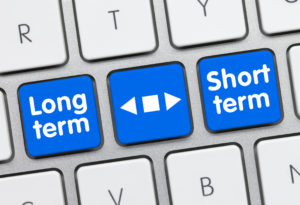The total return on Vanguard’s Canadian Long-Term Bond Index ETF (VLB) since 2020 October 27 is a painful loss of 24%. Why did I choose that particular date to report this loss? That’s when I wrote the article Owning Today’s Long-Term Bonds is Crazy.
Did I know that the Canadian Long-Term bonds returns would be this bad over the past 18 months?
No, I didn’t. But I did know that returns were likely to be poor over the full duration of the bonds. Either interest rates were going to rise and long-term bonds would be clobbered (as they have), or interest rates were going to stay low and give rock-bottom yields for many years. Either way, starting from a year and a half ago, long-term bond returns were destined to be poor.
Does this mean we should all pile into stocks?
No. If you own bonds to blunt the volatility of stocks, you can choose short-term bonds or even high-interest savings accounts. This is what I did back when interest rates became low.
Does that mean everyone should get out of long-term bonds?
It’s too late to avoid the pain long-term bondholders have already experienced. I’m still choosing to avoid long-term bonds in case interest rates rise more, but the yield to maturity is now high enough that owning long-term bonds isn’t crazy.
Isn’t switching back and forth between long and short bonds just a form of active management?
Perhaps. But it’s important to understand that bonds and stocks are very different. Stock returns are wild and impossible to predict accurately. There is no evidence that anyone can reliably time the stock market. However, when you hold a (government) bond to maturity, you know exactly what you will get (in nominal terms). When a long-term bond offers a yield well below any reasonable guess of future inflation, buying it is just locking in a near-certain loss of buying power for a long time.
Are investors safe if they own a bond fund with a mix of maturities?
Bond funds with a mix of maturities certainly mask what is going on, but that doesn’t save investors. Eighteen months ago, the long term bond portion of aggregate bond funds were destined to perform terribly. It was predictable that short-term bond funds would perform better than aggregate bond funds. The fact that all this was largely invisible to bond fund holders didn’t change the fact that the long-term bonds in their aggregate bond funds got hammered. Over 18 months, Vanguard’s aggregate bond ETF lost 13%, while the short-term bond ETF lost only 5%.
Will it ever make sense to own long-term bonds?
If Real-Return Bonds (RRBs) ever offer high enough returns above inflation again, I would certainly consider buying some. The idea of getting a non-trivial return along with inflation protection is very appealing.
Conclusion
It pays to think about what you’re owning when it comes to bonds. You can’t learn anything useful by just staring at the price movements of your bond ETFs. Long-term bonds become dangerous after their prices rise to the point where yields looking forward become very small.
 Michael J. Wiener runs the web site Michael James on Money, where he looks for the right answers to personal finance and investing questions. He’s retired from work as a “math guy in high tech” and has been running his website since 2007. He’s a former mutual fund investor, former stock picker, now index investor. This blog originally appeared on his site on May 5 2022 and is republished on the Hub with his permission.
Michael J. Wiener runs the web site Michael James on Money, where he looks for the right answers to personal finance and investing questions. He’s retired from work as a “math guy in high tech” and has been running his website since 2007. He’s a former mutual fund investor, former stock picker, now index investor. This blog originally appeared on his site on May 5 2022 and is republished on the Hub with his permission.


